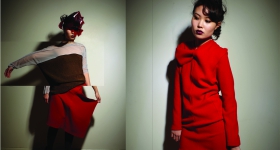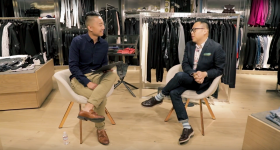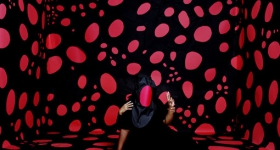“Now, as you can imagine, Seattle, my stand-up isn’t for everyone,” Hari Kondabolu tells the audience toward the beginning of his Netflix special, Warn Your Relatives. “No, no, it’s fine,” he reassures them, “that’s why it’s good.”
I’ve been a fan of Kondabolu’s work since coming across a video of his 2011 set on the BBC show Russell Howard’s Good News, in which he railed against racism, religious discrimination and white chocolate (“From the people who brought you white Jesus,” he quips). Kondabolu, to be fair, does a lot of railing. But in a media world dominated by angry tirades, there’s something about the precision of his anger that keeps me returning to his work. He “punches up” so consistently (and so hilariously) that it’s more than just impressive — it’s always been slightly baffling to me. Stand-up, after all, is the kind of art form where you walk in expecting to be either offended or a little bored. Yet Kondabolu always manages to ride the edge of what seems possible to say in public, while keeping the jabs aimed squarely at power.
I’ve known Kondabolu as a stand-up comedian, as a co-host of the podcast Politically Re-Active with W. Kamau Bell, and as the director of the documentary The Problem with Apu, about the Simpsons character voiced by Hank Azaria. But the picture fills out further when Kondabolu delivers a keynote at the 2018 Facing Race conference in Detroit and I get a chance to see him in his other element — as a former immigrant rights organizer and a speaker on racial justice.
“It feels like a home game,” he says, when we meet backstage after his set. “I don’t need to explain as much.”
Kondabolu’s just performed for the hundreds of activists, legal advocates, journalists and cultural organizers gathered for the annual conference held by Race Forward. If Kondabolu’s work is “for” anyone, it might be this crowd, who can appreciate the deftness of his takes on race and American politics — and who, maybe, are primed by the daily grind of fighting for social justice to be in the market for a little comic relief.
“I love Halloween,” he says in one bit. “Halloween is the only day of the year you can go up to white people and say, ‘Hey — what are you?’”
Kondabolu makes a lot of jokes about white people, and in this room, they kill. He’s animated, confident, totally in control despite what has to be a strange setup for a performer: a huge convention hall with banquet tables and conference-goers continuously walking in and out. He delivers his punchlines with his characteristic balance of bewildered outrage and outright goofiness, getting a lot of laughs and a healthy dose of what some comedians call “clapter” — laughter mixed with applause. This is, mostly, a relief response — in this case, the particular relief of hearing someone say the thing about white supremacy you can’t say at work (at least in front of the funders).
After his set, Kondabolu’s kept onstage for a Q&A conversation with Jeff Chang, Race Forward’s vice president of narrative, arts and culture, during which he makes clear his priorities as an artist.
“I don’t make art for social justice,” he says. “I don’t make art for activism. I make art because I think it’s good art and because it reflects how I see the world.”
“I like that the work I create can be used by activists and organizers and teachers to spread ideas that they think are valuable. But I’m not going to approach my art as a mission-driven thing,” he tells Chang. “I’m not an activist. I’m a stand-up comedian.”
* * *
Facing Race isn’t the first social justice conference I’ve been to, but it’s only my second time there in the role of “artist.” In the past, I’ve chaperoned youth organizers, run sessions and presented on the campaigns we were fighting. It was easy, then, to know which talks to go to, to pick out the panels that seemed most useful for our work navigating police accountability and the carceral state.
This time, I wander the hallways of the Cobo Center in downtown Detroit, a city that makes the vast sterility of a convention center even stranger than usual. I leave a session about using speculative narratives to develop organizing strategy in order to dip into another one called “Just Transition to a Feminist Economy.” I take pages of notes. At lunch, instead of reading back over them, I make corrections on the proofs for my poetry book. When I shake people’s hands, I’m not sure how to explain why I’m there.
"I like that the work I create can be used by activists and organizers and teachers to spread ideas that they think are valuable. But I’m not going to approach my art as a mission-driven thing."
On stage with Jeff Chang, Hari Kondabolu gets a version of the same question I’ve gotten over and over again, that every so-called “political” artist gets: “How does your art intersect with your activism?” This question was easier, I think, to answer when I had something I could point to as “my activism.” It got harder to answer when I left my city to get a creative writing MFA, when my only connections to political organizing were my long-distance partner’s job and the themes of social justice that remained in my writing. And poetry, at that — what some might call the least practical art form of all.
“I’m proud to know that my work is useful,” says Kondabolu, and I immediately run through my table of contents in my head, wondering if I could say that about any of my poems.
I wonder if this pressure — to be useful to social justice movements — is a particular one felt by artists who have spent time in the world of organizing, where resources are scant and the day-to-day stakes are high. Prompted by Chang, Kondabolu discusses his entry, as a teenager, into political work.
“9/11 happened, and everything changed,” he says. “All of a sudden I was like, how come there are hate crimes all over the country on other brown people? Why is this happening? And then you start going over the history of America more critically, and you realize this is how it’s always been.”
These realizations led him first to an internship at SAALT (South Asian Americans Leading Together) and eventually to several years working as an immigrant rights organizer in Seattle. In 2008, he received a Masters in Human Rights from the London School of Economics.
But for Kondabolu, who started doing stand-up at 16, comedy has been a constant thread through all of his other work, not least of all for its particular ability to make people listen.
“The cool thing about comedy,” says Kondabolu, “is that people are willing to open up for a little bit longer than normal because you’ve promised them something. You’ve promised them laughter. So, in the name of laughter, they will put up with you saying things they wouldn’t normally put up with.”
“The things I said to you today, I say to people in clubs all over the country, where the crowd does not look like this,” he says, looking out at the audience, who are dressed in that particular range of garb acceptable at a social justice conference (blazers over #BLM shirts, trendy glasses, traditional prints). “And people, for the most part, stay, because I’ve promised them they’ll enjoy it.”
“And for some of them, yeah, I did lie to them,” he admits, getting some chuckles. “They’re not going to enjoy it. And that makes me feel good, because I have their money.” Laughter ripples through the convention hall.
* * *
On stage, both during his comedy set and in the post-show Q&A, Kondabolu is loud, confident, charming even in the throes of anger. Backstage, after signing albums and meeting-and-greeting a long line of fans, he looks more exhausted than anything. He speaks low, keeps his arms crossed, doesn’t make much eye contact. I get it. For years, I’ve made a large chunk of my living performing poetry across the country, and I’m deeply familiar with the way all your energy leaves your body as soon as you step away from the stage, the high school auditorium, the book signing, the convention center. I see that tiredness in Kondabolu's face as we start talking about the concept of “civil discourse.”
“What does that even mean?” Kondabolu says, in frustration. “It means: you state your point of view, I state my point of view — now what happens? The status quo. And that’s fun, you know, but we’re talking about people’s lives. We’re talking about life and death. I don’t think artists have any responsibility to be civil in their discourse.”
Which begs the question: What is the responsibility of artists? This, of course, is a terrible question, an old and impossible question, made more impossible, for some, by identity markers like race and gender and the peculiar crosshairs they put us in.
“From the mainstream, we’re looked at as the Other, but from our community, we’re seen as representatives of our community. That’s a big deal,” says Kondabolu. I nod as he talks about the pitfalls and challenges of that double responsibility, and we share a moment around the first time we each heard comedian Ali Wong’s bit about “fancy Asians” and “jungle Asians” from her first Netflix special, Baby Cobra.
“I remember being shocked because she was doing it not just for the community,” he says. “And jokes like that, historically, are just in-community jokes.”
“I know, doesn’t it make you so nervous?” I say.
“That’s exactly it!” he says. “It’s like, you’re sharing this with them? But — you’re sharing it with them because it’s your experience. And if they don’t get it, they’ll figure it out. Why do we have to keep centering whiteness in all our discussions?”
It’s a particular kind of responsibility, to not be “for everyone” but instead to be loved by (and therefore accountable to) a community.
I mean to ask more about the idea of responsibility and what it means to make political art, but we get caught up talking about comedy. We talk about Hannah Gadsby’s special Nanette, and whether it should have been a one-person show (“Who gives a fuck what they call it? Did it move you?”). We rave about Aparna Nancherla. At one point, I ask if it’s okay to ask a more craft-based question.
“Of course,” he says, “I love craft questions.”
I do, too. Every artist of color I know does, though we’re not often asked them. This, too, I think, is a relief response. Because having a home crowd to play to is, of course, both a relief and a burden. It’s a particular kind of responsibility, to not be “for everyone” but instead to be loved by — and therefore accountable to — a community. So, it’s true: those moments in which one gets simply to be a practitioner of their craft rather than constantly batting away the label “activist,” to be, as Kondabolu puts it, “not an Indian comic, but a comic,” can feel strangely precious.
Despite knowing this, I panic slightly when the conference staffer backstage tells me I can ask one more question; scrambling, I ask something along the lines of, “What do you think is the role of Asian American creatives right now?”
“What do you mean by that?” Kondabolu says immediately, and I realize I don’t know. I try to word the question differently, and the more I try, the more I realize how bad the question really is. It’s wonky enough, after all, to try to conceptualize Asian Americans as anything like a cohesive political bloc, to strategize about how to leverage our collective voices in larger conversations about race and power in America. That framework is enormously challenging to wield in politics; in the arts, it’s a death knell. There’s got to be a better way to think about what “political” artists do, about how craft and responsibility might not just intersect but feed each other, but I’m not sure I know what it is.
So instead, we spend our last minute talking about Kondabolu’s favorite up-and-coming South Asian American comics — people like Subhah Agarwal and Umar Khan. When I thank him and get up, the next young Asian American journalist is there, excited to take my place on the interview couch. I’m reminded of the work that this work takes. And hope that, despite all the stresses and burdens that come with paying a visit home, that he’s also gotten something — some fortitude, maybe — to bring with him when he heads back out to the away games.










Comments